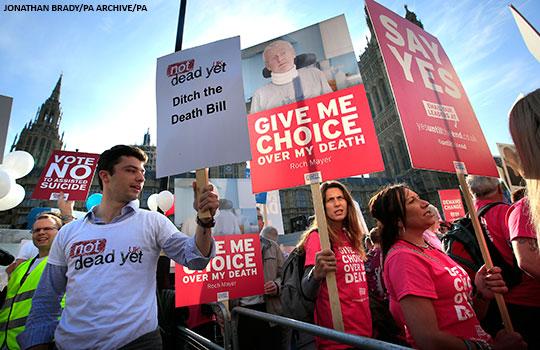Assisted dying remains deeply contentious for all
 The day after The BMJ published another collection of articles on the controversial topic of assisted dying, with a call for independent polling of all UK doctors and for professional bodies to adopt a neutral stance, the Royal Society of Medicine held a sold-out seminar on end of life care.
The day after The BMJ published another collection of articles on the controversial topic of assisted dying, with a call for independent polling of all UK doctors and for professional bodies to adopt a neutral stance, the Royal Society of Medicine held a sold-out seminar on end of life care.
Many speakers, including palliative care doctors, patients’ relatives, and activists, shared their views with a packed auditorium. Presentations also considered legal and regulatory concerns.
Public Health England’s medical director, Paul Cosford, reflected on his recent diagnosis of incurable lung cancer. “Knowing I have control over the end of my life would allow me to live a better life now,” he said. But he cautioned that reducing current inadequacies in end of life care to a polarised debate about whether or not assisted dying should be legal “misses the point.”
“We should focus on how to help all of us to approach the end of life in the way that works best for us all individually,” he said. Legal reform alone may not represent progress, he thinks.
Although the room concurred that access to the best end of life care can be patchy, several speakers gave uncompromising arguments for their stance on assisted dying, and debate was lively.
Two relatives of patients spoke in favour of legal assisted dying. One of them, Julie Smith, described her dying husband’s palliative care as a “broken promise.” His GP practice was unwilling to help with the paperwork necessary to travel to Switzerland for an assisted death at Dignitas’s clinic. But the same practice helped a different patient with the same request, she said, highlighting doctors’ confusion about what could constitute a breach of the Suicide Act.
Disabled people wary of doctors
The campaign Not Dead Yet UK represents disabled people opposed to assisted suicide. Its spokesperson, Juliet Marlow, said that she knew of no group run by and for disabled people that supports assisted dying. Current law is a necessary deterrent to abuse, she said, given negative societal attitudes towards, and current huge cuts to social security for, disabled people.
It was sad to hear her say that many disabled people are “already wary of doctors,” and, of assisted dying: “We are scared by this. It is a threat to us.”
California is one of the most recent jurisdictions to allow legal assisted dying, and Catherine Forest, a primary care professor at Stanford and family medicine doctor, sees providing access to it as similar to providing access to medically assisted childbirth. She maintained that “suicide” is the wrong word to describe assisted dying because the terminally ill patients choosing it “want to live, but not in this way.” She explained how the option and safeguards, for doctors as well as patients, work in practice and said that access to assisted dying encourages earlier conversations with patients and better care in dying.
The palliative care expert Ilora Finlay, who previously argued against the Marris-Falconer Bill in The BMJ, said that coercion could never be completely excluded, and that assisted dying doesn’t always result in a “good death.” She also said that an upward trend in the tiny number of patients choosing an assisted death in Oregon, where it has been legal for two decades, was cause for caution.
Emotions can cloud judgment
Rob George, immediate past president of the Association for Palliative Medicine of Great Britain and Ireland, is “morally opposed” to assisted dying. “It’s not nimbyism,” he said, explaining his worry that the intensity of emotions in the relationship between clinicians and dying patients could cloud their judgment.
He worries about further moves to medicalise dying. “Most people think that death happens only when the doctor does something. Most doctors do too. Dying is dying from life, not just disease. It’s a social process,” he said. He repeated an often made point, that making dying a therapeutic option could expose it to economic pressures and utilitarian thinking.
Audience members expressed a spectrum of views, including calls for broader criteria than the Marris-Falconer Bill allowed for, to include people with progressive illness but who are not terminally ill, for example, and terminally ill people with prognoses longer than six months. Others concurred that current end of life care is a lottery of suffering, with patients who know how to navigate the system likely to fare better than others.
Could opposition damage doctors’ reputation?
One audience member asked what impact the opposition of doctors’ organisations to assisted dying might have on the reputation of the profession—and on respect for the law—if consistent support among the public continues to be ignored. He called for “engaged neutrality” from bodies like the BMA.
Several speakers mentioned conscientious objection; in California both individual professionals and institutions can opt out of assisted dying, said Forest. The General Medical Council’s chair, Terence Stephenson, suggested that were British law to change, the regulator would protect doctors who object to being involved for moral or religious reasons, in the same way as for abortion.
A hospice chaplain spoke in favour of assisted dying. The issue of whether religiosity feeds into the debate seems underexplored, but could there be a mismatch between the public’s views on whether “sanctity of life” trumps all other concerns and those of doctors and MPs?
Jacky Davis, of the pressure group Healthcare Professionals for Assisted Dying, says that members of congregations have been asked to lobby against legal reform in covert campaigns by churches. Davis’s recent Personal View challenges the BMA to take a neutral stance on assisted dying.
Polls, damn polls, and web bots
Meanwhile, interest in a completely unscientific poll on bmj.com, “Should doctor assisted dying be legal?” has reached unprecedented levels, with more than 22 000 votes to date. In 2011 a similar question received 665 votes.
In 2012, “Should doctors’ organisations be neutral on assisted dying?” received 6592 votes—with analysis showing multiple voting and campaigning on both sides likely.
At least one robot was at work in the current poll: a single IP address registered in the Westminster area has regularly voted No almost 2000 times. More than one device can share an IP address, but the top 12 IP addresses for multiple votes have cast 4000 votes between them, 3999 for No. Hopefully this was not prompted by Dignity in Dying, a campaign that supports assisted dying, sending last week’s print issue of The BMJ to 600 MPs in England and Scotland.
The only conclusion is that assisted dying remains deeply contentious for all. Reaction to The BMJ’s recent articles has been immense, and we’re keen to continue to provide a platform for all relevant views on assisted dying, for, against, or neither—so let us know your thoughts.
Richard Hurley, features and debates editor, The BMJ. rhurley@bmj.com Twitter: @rich_hurley
